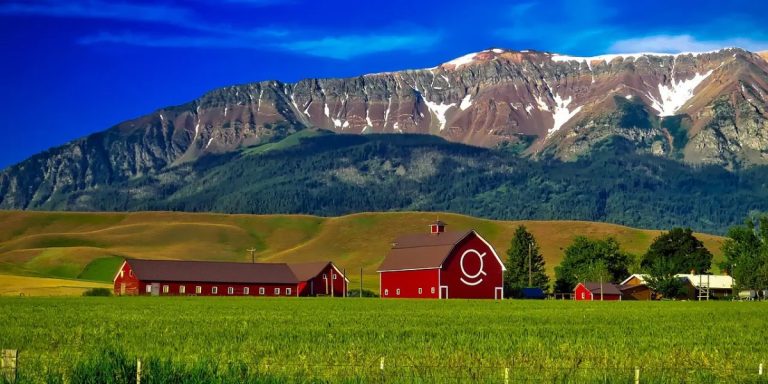from climate realism
Author: Linny Luken
News website OPB [Oregon Public Broadcasting] published an article titled “Climate Change Increasingly Impacting Oregon Farmers and Ranchers,” which claimed that climate change is having such a severe impact on Oregon agriculture that farmers need special climate grief counseling to deal with it. This is wrong. OPB claims that droughts, wildfires, and heat waves are all becoming more severe as climate changes, but data shows that's not the case in Oregon.
OPB claims the state's farmers and ranchers “increasingly face severe droughts, wildfires, scorching heat waves and pests that can destroy entire fields.”
OPB states later in the article that “in many areas of the Pacific Northwest, more precipitation is rain rather than snow” and that “snow is less and melting earlier, which means it lasts long enough during the winter and spring There would be less water available to replenish streams” and reservoirs for agricultural irrigators. ” Summers are said to be getting hotter, with extreme heat waves becoming more frequent.
Oregon has not suffered a more severe drought since the drought began. According to the U.S. Drought Monitoring Center, there is no indication that Oregon's drought is worse today than it was more than 100 years ago in a warmer climate. (See below)

In fact, the worst droughts appear to have occurred in the 1970s and 1930s. D4 drought conditions are the most severe, occurring less frequently and in extent than in previous decades.
Since 2000, the situation has become even less worrying. Oregon has experienced only a few months of severe drought in the past 24 years, in 2004 and 2021-2022, but even then, the drought covered less than a third of the state. Currently, 24% of the state is experiencing “moderate drought.”
This fits well with the overall U.S. data discussed in Climate Overview: Droughts, which explains that droughts in the U.S. have actually decreased over time as the climate warms modestly.
The article partially acknowledges this reason when OPB says more precipitation falls “as rain rather than snow.” This language is taken directly from the NOAA National Centers for Environmental Information National Climate Summary (NCEIS); however, Oregon's summary page simply says that more precipitation “is expected falling as rain rather than snow,” but that is not the case. There is no data showing that snowfall has decreased or is trending downward in recent years or decades, and NCEIS only asserts that winter precipitation is expected to increase. In fact, whether precipitation Will it really increase, and if so, whether it will fall as snow or rain, is currently unknown.
National trends point to slightly less snowfall in late spring, but that doesn't appear to be the case in Oregon yet, according to the USDA's National Water and Climate Center. (See below)

In fact, Oregon set a record for April snow water equivalent in 2022, with the second-highest year in 2023, according to USDA data dating back to 1981.
About wildfires, again, climate realism It has been reported many times that the wildfires in the United States are not getting worse, and the wildfires in Oregon are not getting worse.
According to data from the Oregon Department of Forestry, except for two special years of drought in 2020 and 2021, Oregon has not seen an increase in the area burned by wildfires. (See below)

Oregon's heat wave is also not getting worse, at least not continuously. The NCEIS report said that while Oregon has had a higher-than-average number of extremely hot (over 100°F) days since the late 1980s, peaking in 2005-2009 and 2015-2020, “the number is well below The 2010-2010 average for the 2014 period suggests there is a more complex trend than a gradual move toward eternal heat syncope across the state, with 2023 also being below average.
The situation for farmers is so dire, OPB claims, that “workshops and training are needed to help food producers identify and define feelings such as climate stress or sadness, and find ways to cope emotionally and agriculturally.” But long-term weather and crop production trends Neither supports the idea that climate change is killing Oregon agriculture. So there seems to be no need to consider anxiety about seasonal crop failures as “climate grief.”
One of the examples of farm problems cited in the OPB article was a hazelnut farmer who lost trees to frost. However, one farmer’s experience is not representative of Oregon hazelnut production as a whole. In fact, Oregon is the largest producer of hazelnuts in the United States. And, according to the U.S. Department of Agriculture, hazelnut production in Oregon has surged 149% since 1999.

This example illustrates that anecdotes about the plight of a single or a few climate-concerned farmers are not good indicators of the state of agricultural production in the state.
OPB should stick to the facts instead of trying to spin a climate story based on farmers’ fears of crop loss, as should organizers of so-called “Climate Stress and Grief” groups and workshops. Taking advantage of people whose livelihoods do depend on the weather by promoting unfounded climate fears may make good headlines and generate some revenue, but it is just as misguided as efforts to ban the use of fossil fuels, which adapt to climate change. Resilience.
related
Learn more from Watts Up With That?
Subscribe to have the latest posts delivered to your email.
